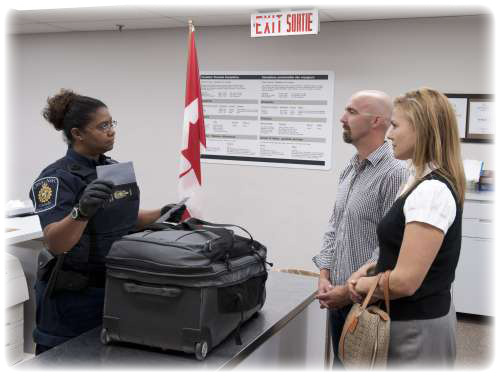
Photo Credits: Canada Border Services Agency
What you can bring to Canada
To move to Canada from your country of origin, you may bring your personal items with you and ship household goods without paying duty. But you will have to pay duty on any item you bring that has not been used. A duty is a fee that the government charges on some goods when they enter Canada. The information below is directly sourced from Immigration, Refugees and Citizenship Canada and Canada Border Services Agency.
| You don’t have to pay duty on: | You do have to pay duty on: |
|
|
Goods to be Declared
- Travelling with CAN$10,000 or more
If you have currency or monetary instruments equal to or greater than CAN$10,000 (or the equivalent in a foreign currency) in your possession when arriving in or departing from Canada, you must report this to the CBSA. Monetary instruments include items such as stocks, bonds, bank drafts, cheques, and travelers’ cheques. We remind all travelers that this regulation applies to currency and monetary instruments you have on your person and in your baggage
- Food Plant and Animal Inspections
You need to report all agricultural or food items or any animal, animal product, plant or plant product to a CBSA Officer upon landing. Without the required documents, the entry into Canada of some animals, plants, animal products or plant products is not permitted. They may be confiscated and disposed of or ordered removed from Canada as a result. Other items may require treatment before they can remain in Canada. Travelers are responsible for all costs related to the disposal, quarantine, treatment or removal from Canadaof any non-permitted items.
- Alcoholic beverages
Alcoholic beverages are products that exceed 0.5% alcohol by volume. If you meet the minimum age requirements of the province or territory where you enter Canada, you can include limited quantities of alcoholic beverages in your personal entitlement. These itemsmust be in your possession upon your arrival/return. Minimum ages for the importation of alcoholic beverages as prescribed by provincial or territorial authorities are 18 years for Alberta, Manitoba and Quebec; and 19 years for the remaining provinces and territories.
You are allowed to import only one of the following amounts of alcohol free of duty and taxes:
- 1.5 litres (53 imperial ounces) of wine;
- a total of 1.14 litres (40 ounces) of alcoholic beverages; or
- up to a maximum of 8.5 litres of beer or ale.
- Tobacco products
You are allowed to bring all of the following amounts of tobacco into Canada free of duty and taxes if these products are in your possession upon arrival:
- 200 cigarettes;
- 50 cigars;
- 200 grams (7 ounces) of manufactured tobacco; and
- 200 tobacco sticks.
Note: If you include cigarettes, tobacco sticks or manufactured tobacco in your personal exemption allowance, a partial exemption may apply. You will have to pay a special duty on these products unless they are marked “CANADA DUTY PAID ● DROIT ACQUITTÉ.” You will find Canadian-made products sold at a duty-free shop marked this way. You can speed up your clearance by having your tobacco products available for inspection when you arrive.
IMPORTING OR TRAVELLING WITH PETS
Under the National Animal Health Program, the Canadian Food Inspection Agency (CFIA) establishes import requirements for all animals and animal products entering Canada-including domestic pets. The CFIA provides information about importing domestic pets on its Web site.
These requirements apply to:
- animals entering Canada permanently
- animals in transit through Canada on their way to a final destination
- animals entering Canada for a temporary visit
The Agency can refuse entry to any animal presented for importation.
